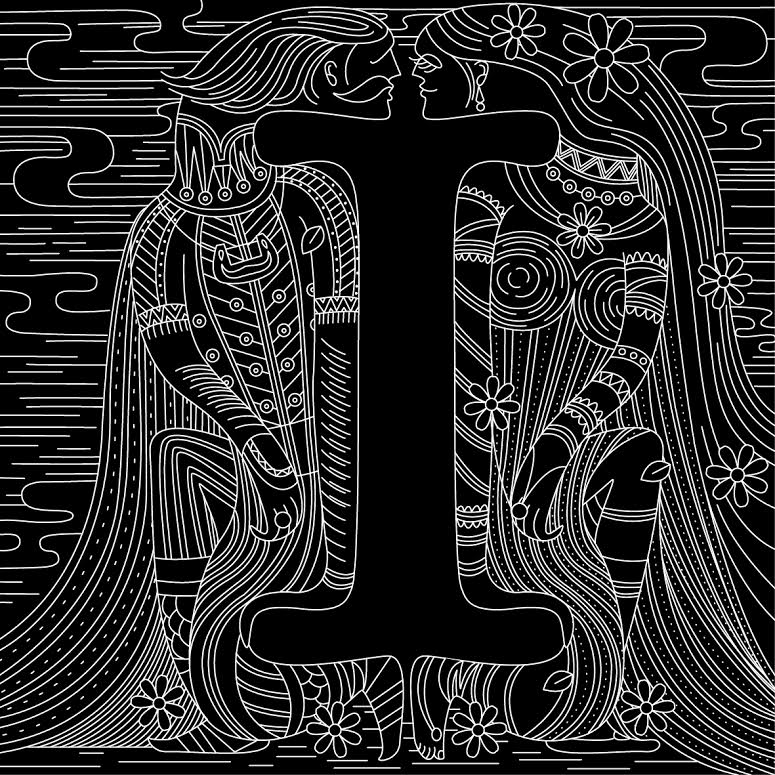[This story is part of an ongoing project called little word art, artistic collaborations with various passionate and talented illustrators from around the world. Learn more about this artist here.]
The first time Leander fell in love, it was in complete darkness. This was also the only time he ever fell in love, so it would be right to say he saw love as nothing more than fallen shadows of the night.
It happened last August as he was swirling boring ice cubes around the insides of his boring, empty glass, leaning against a boring white wall at the most boring party he’d ever attended. Before love, the party: This gathering, called A Something-Boring Summer Night to Benefit Some Boring Disease, had been organized by his parents’ distant friends, husband and wife philanthropists (also boring), presumably because they needed an excuse to throw away their boring money and pretend to care. Leander knew the truth: They were just bored.
And so was he. Although the boredom was nothing new; his parents made him attend these sorts of parties almost every other week.
(“Leander, you’re a grown member of society and you must do what’s right.”
“Did you tell that, darling mother, to the fox whose fur was skinned to make your coat?”)
Bored or not, Leander lived in a time when to disobey meant to dishonor and if there was one thing he held tight to his heart, it was the honor of a son born to righteous breed and moral obedience. The very idea brought Leander comfort, enough to remain at the boring party on that August night, though he left the boring white wall and empty, ice-cubed glass behind in search of a less-boring balcony and fresh air.
Here’s what he found: Love. Is there any other way to describe such a beauty, with cheeks made from whatever fabric was finer than silk and eyes colored a deeper blue than the clearest of midnight skies? Her presence rendered words useless, turning them into nothing but clumsy sound.
“I … I …”
Leander could only stare, stupidly, awkwardly, and felt her perfumed warmth even as she slipped toward the corner of the balcony, huddled in darkness and wrapped in the sticky air of a midsummer night. He was jealous of the air – had that ever happened before? – and then angered at his crippling reticence as he felt their gaze slip. For one humid, terrifying moment, he thought she was gone, lost to the vignettes of champagne-glass-holding women and utter boredom of a party suddenly transformed into the most thrilling night of Leander’s life.
He had to get her name.
Leander moved to her more easily than expected, with a heart begging to escape his chest and speckles of sweat threatening to wet the thin space between his oft-complimented brows. What he said to make her turn escaped his mind and he only saw her chiffon-doused limbs move in his direction, rose bud arms and daffodil legs blooming before his eyes. She looked at him and he watched her smile with teeth that rivaled the stars in brightness; it only took one delicately laden breath – it barely reached his lips – and Leander understood that Hero, a woman perfectly named to fit her gallant presence, loved him too.
For three months and seventeen days Hero and Leander met beneath the cloak of darkness, Leander guided by a fire Hero lit outside her window before she hid in bed, waiting. He learned so much about her in those few weeks: how she lived alone with one attendant in a ten-story watchtower across the Hellespont Sea; how her parents had kept her isolated since she was a child, fearing Hero’s beauty would incite men to violence, (for this, Leander thanked the philanthropists in all their boring glory); how the summer party was her one yearly chance to see the world, always on her birthday, (in August, she had turned twenty two); how she never much liked tomatoes but would eat anything with a plumb; how the curve of her chin crinkled when she laughed; how her sleepy sighs seemed gilded in spools of pure gold.
Time, for Leander, became unruly. Sometimes minutes stretched out longer than they had any right to stretch, especially the ones hidden inside daylight hours when nothing was ever important until the sun finally set. And other moments, (these particular kinds only showed themselves when he was with Hero), felt like small, brilliant eternities, and Leander came to nestle inside them for as long as he could, memorizing the contours of Hero’s ear as scalloped lines on a seashell, studying the bend of her elbow as his own deep sea treasure no one else had found.
Her fire was his lighthouse and every night when the sky blackened and the moon and stars clung tight to the sky, Leander unmoored his small boat, The Aphrodite, and paddled across Hellespont, guided by this blazing beacon, to his life with Hero. Just before the first tendrils of light glinted the morning sea, Leander would leave Hero, heart breaking with the new day, to dip his oars into the Hellespont waters and send The Aphrodite sailing where he never wanted it to go.
It was much easier to paddle from Hero’s watchtower than it was to journey the other way around; Leander thought this right that the currents should form strong enough to make him feel the pull of her as he came closer and closer to her light then feel hardly anything at all in distant, lazy waves that rolled far from her tower and couldn’t know the power in Hero’s touch.
But the same time that brings light to darkness or turns calm seascapes to storm can become a fickle friend and fast enemy to those who, like Leander, dare doubt the consequence of its ways.
After three months and eighteen days of nights spent with Hero, Leander waited as always in the shadows by his makeshift dock until he could see the light. Tonight, nothing. He looked across the sea, toward wayward waves silhouetted against the dim twilight. And Leander knew: His love had broken, whether because of the wind that showed its wrath on a cold, near-winter night, forbidding Hero’s fire to burn, or because her heart really had shifted, no longer willing to let Leander breach its ten-story towering shape. For the second time in Leander’s life, words collapsed to futile, irrelevant pieces of reverberation thrumming idiotically through the terrible night.
“I … I …”
So Leander said nothing more, untethering The Aphrodite and letting it sail away. Broken, empty and betrayed by the dictums of time, (if not also love) Leander jumped into the water of the Hellespont wanting to find the darkness again.



2 Comments